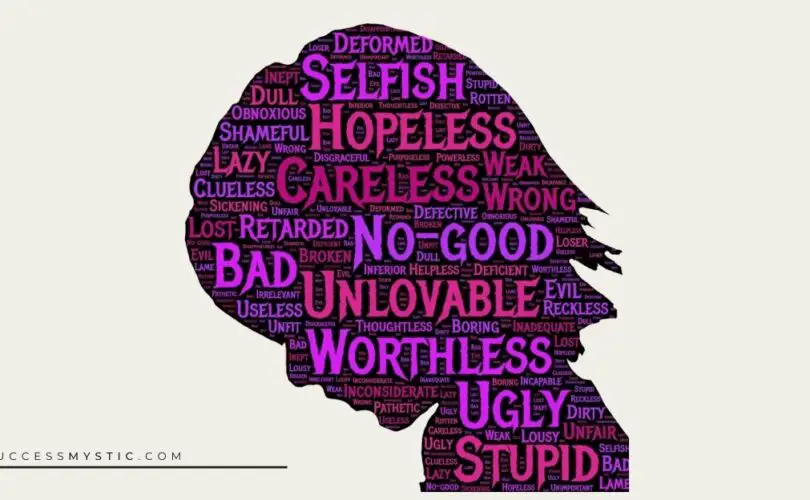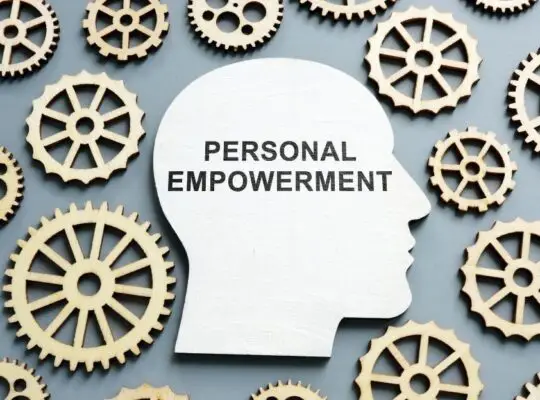In this article: Stop judging yourself, break the cycle of self-criticism and embrace yourself with love.
The world is full of judgement–many people face insecurities about how others perceive them. The root behind this fear makes sense: When others judge you, you can be ostracized from a group from appearing to be different. In the primal world, this is a recipe for disaster.
Humans are like other herd animals who depend on the support of others to survive. If you get judged out of the herd, you’re left to fend for yourself.
However, what happens when the judgement you’re experiencing comes from within? When you practice self judgement, you’re being overly critical of yourself. Self judgement can be rooted in past judgement from others, but when self judgement settles in and becomes a regular habit, it can lead you down a dangerous pathway. When you begin regularly judging yourself and criticizing your own actions, you can develop a deep dislike and distrust of yourself.
Your relationship with yourself is the most valuable and closest one you’ll ever experience. Nobody will ever understand you the way that you do; maintaining that relationship with yourself is critical.
While it can be easy to fall into a self judgement pattern, it’s necessary to break the cycle and learn to treat yourself fairly and nonjudgmentally.
What Causes People To Be Too Self-Critical
A variety of factors can lead to issues with being overly critical and judging of oneself. According to a report in US News, the seeds of developing issues with being self-critical are often planted early during childhood.
As young children, human beings begin to take note of how other people perceive them. When others see them doing something they “shouldn’t” do, they make comments, give judgmental looks, or ostracize them from the group (remember when that group of kids didn’t want to pick you for the dodgeball team in elementary school?).
Besides being judged early by peers, familial relationships can also be the source of self judgement forming–if you grew up in a highly restrictive household with judgmental parents, some of those tendencies may have affected the way you perceive yourself.
When parents or other close relatives hold you to an extremely high standard from a young age or make comments about different aspects of your appearance etc., you begin to allow the tendrils of self judgement grow inside your mind.
Other than learning to be harshly judge yourself from past experiences, other factors can lead to a development of these tendencies. For example, if you develop an insecurity, you likely show signs of being overly self-judgmental as well.
Sometimes, a triggering event similar to those you may have experienced in childhood can happen when you’re an adult. While it’s more commonly formed in childhood, tendencies to be self-judgmental can form anytime.
9 Signs You Are Too Judgmental Of Yourself
Everyone’s “inner judge” presents itself differently. There are some commonalities between the way different people criticize or judge themselves, however. Consider the following signs of being too self-judgmental to determine if you fit some of the common characteristics:
1| You have a fear of doing anything in front of others, especially if it’s in front of a group.
The idea of doing anything in front of others’ watchful eyes terrifies you. Even if you’ll be performing a task, you’ve done many times with success, the idea of doing it in front of an audience feels nearly impossible.
You fear that the other people observing you will pass judgement, so you judge yourself critically before you even give yourself a chance to try. If the idea of having to speak, perform, or work in front of others feels impossible, it’s likely that you’re being too self-judgmental.
2| You decline opportunities to try something new or take on a challenge because you fear failure.
Your inner judge often convinces you of terrible, conniving things. One of the most popular narratives of a very active inner judge is the idea that you can’t do something, aren’t good enough to do something, or will fail at something if you try.
When these ideas start brewing, your self judgement stops you from exploring a new opportunity because you assume you’re going to be a massive failure right from the start. This immediate assumption of imminent failure stops you from trying all sorts of new things–and missing out on good opportunities because of it.
3| Your “inner judge” is the loudest voice inside your mind.
We all experience lots of internal dialogue throughout the day. Your inner dialogue may be going through a shopping list, making notes of things you observe, and planning for what you’ll do later in the day. However, when these chatty voices get silenced by your inner judge’s mean, critical voice, you’re probably experiencing problems with judging yourself.
4| You develop issues with mental health (or feel existing issues worsening).
If you can sense deep issues with your mental health forming, your self judgement may be going too far. Sometimes it can be difficult to determine whether or not you have a serious problem with self judgement. After all, everyone judges themselves sometimes. If you feel your mental health declining, it’s a sure sign that your self judgement is advancing to a far more serious stage.
5| You place a lot of incredibly high expectations on others.
When you judge yourself constantly, you may begin to project your high expectations onto other people. Because you judge yourself so critically and harshly, you may begin to expect the other people in your life to meet those same extreme standards. If you find yourself judging others based on the extreme parameters you set for yourself, self judgement may be a big problem for you.
6| You tend to harbor a negative outlook on many areas of life.
When you spend a lot of time in the dark cloud of self judgement, it’s tough to feel good about anything else happening. If your self judgement is getting too extreme, you might notice that everything tends to take on that same dull, negative feeling. It’s tough to be happy or content with anything when you’re spending so much time and energy being hard on yourself.
7| You don’t allow yourself to be creative or explore new outlets of self-expression.
This aspect of self judgement is a close relative to #2. Specifically, this characteristic involves a lack of creativity and expression. When you’re being too critical of yourself, the idea of being creative or expressive may seem like a big waste of time. For example, you may think, “why bother being creative or making something….I’ll probably mess it up,” or “I’m not good enough to make anything or express my ideas.”
8| You use a lot of self-deprecating humor to cope with your feelings about yourself.
Humor is an effective way to hide pain from others. When you spend a lot of time being self-judgmental, a lot of the negative feelings you have toward yourself may escape in the form of a joke or a wise crack at your own expense.
When others are laughing at your jokes, it makes everything feel a little better. However, the feeling is temporary–the root of those jokes, your self judgement, won’t subside and may even feel worse afterward.
9| Everything begins to feel hopeless or bleak.
When you don’t have a good relationship with yourself, it’s tough to feel good about anything else in life. Being overly self-judgmental can begin to test the trust you have with yourself. If you can’t trust yourself to treat yourself well, how can you trust anyone else to treat you well?
How can you trust that anything else will go well for you? The self judgement cycle can wreak havoc on all areas of life by making everything feel bleak.
What Does A Person Who Is Self-Critical Look Like?
Self-judgmental people are all unique, but there are some common characteristics that are evident among most of them. To get a better understanding of what a self-judgmental person looks like, consider the following case study as an example:
Rita just started her first year of college. There is a lot of pressure on her to perform well–as the only child of two Mexican immigrants who moved to America to provide her with a better life, Rita is used to hearing how hard her parents worked for her to have a better life and how much they expect her to succeed.
When she was a high school student, Rita was never allowed to spend much time with friends. Instead, she did tons of studying and homework. When she wasn’t worried about homework assignments, she was busy working at her parents’ grocery store, at track practice, or participating in a track meet.
Rita’s whole life is about hard work and success–her parents expect nothing less than her absolute best.
Because of these extremely high expectations, her parents often passed regular judgement on Rita, such as:
- You probably shouldn’t tell your friends you can spend time with them–you have to work all weekend.
- I can’t believe you missed that question on the test….we practiced it so many times!
- You almost came in first at the track meet. Maybe push harder in practice so you’ll succeed next time. College recruiters want people who come in first place.
- We worked too hard for you to not get straight As on your report card.
- You need to watch your grades–that other student is close to taking the valedictorian spot from you.
Over time, her parents’ judgement about what she does, how she does it, and when she does it have ingrained themselves in Rita’s mind. Rita trusts her parents and knows they worked incredibly hard for her to be a success in America, so their judgmental attitude seems like the right pathway for her to follow.
For example, Rita has begun to have her own similar self-judging and critical thoughts, such as:
- I’m not smart enough to keep up my grades in these college honors courses.
- I’m probably going to flunk out and devastate my parents.
- Trying to make friends or date is a waste of time; I’m too busy to have those kinds of relationships.
- If I have any fun, I’ll get too distracted from my work.
- Maybe if I spend a couple extra hours practicing each week, I can improve my track time by a few seconds.
- Getting extra sleep and eating dinner isn’t as important as finishing this term paper.
In this scenario, it’s easy to see how Rita’s parents planted the seeds of self judgement within their daughter very early in her life. While they probably didn’t mean to do so, their extreme restrictions and judgements of Rita’s personal choices affected the way she perceives herself.
Rather than letting herself try new things, relax, or accept the occasional mistake, Rita uses self judgement to keep herself on a dangerous and difficult path toward perfection.
No two cases of self judgement look the same, but Rita’s has some common characteristics that can be seen in other self-judgmental people, such as:
- Denying herself a chance to try new things, like making friends or initiating a new romantic relationship
- Wearing herself out with studying and practice
- Speaking to herself in a hopeless, unkind way
- Projecting her parents’ childhood judgements onto her adult college self
- Denying herself basic needs, such as meals and sleep
- Obsessing over the possibility of failure
- Imagining the worst case scenario instead of examining the facts of her situation
6 Dangers Of Allowing Self Judgement To Continue Unchecked
Allowing yourself to continue with self-judging behaviors can lead to a lot of issues. When allowed to go on unchecked, self judgement can create a lot of barriers in your life that can feel insurmountably painful and difficult to navigate. Self judgement tends to find a way out of your own mind and into many other areas of life when it isn’t stopped.
1| Your mental health can deteriorate.
Feeling constantly put down can take a big toll on your overall mental health. Even if you never had previous issues with mental health, you could develop new problems from constant self judgement.
When you judge yourself constantly and attempt to limit yourself through criticism, you create a negative internal environment. Over time, you begin to believe all your self judgements, making yourself feel worse as time progresses.
2| You can lose any sense of trust you had with yourself.
When you judge yourself constantly, you ruin the sense of trust you have with yourself. By overanalyzing your choices, micromanaging your appearance, and limiting your behaviors based on self judgements, it becomes difficult to trust yourself.
Even beyond trusting yourself, you can lose touch with your intuition. All those self judgements can make you feel like you can’t trust any of your internal signals, so you’re more likely to ignore signs from your intuition.
3| You stop yourself from being able to make any kind of progress on personal goals.
Self judgement impedes progress towards goals. If you’re constantly judging your personal choices and second guessing your capabilities, you’re never able to move forward with your goals.
Self judgement can even stop you from forming new goals. Instead of changing goals or adopting new goals you want to accomplish, your self judgement can limit your growth altogether, causing you to lose interest or drive in seeking new opportunities for yourself.
4| You isolate yourself from others.
Self judgements can turn into insecurities quickly, For example, if you’re constantly judging yourself over certain aspects of who you are, it’s easy to assume that other people are also judging you the same way. Self judgement creates a doorway for insecurities to begin affecting your relationships with others.
When you start feeling like everyone else is also judging you, you may begin isolating yourself from other people as a way to protect yourself from harm. In reality, you’re causing more harm than you are protecting yourself–by isolating, you’re ruining existing relationships and preventing new ones from forming.
5| Your self-esteem plummets.
When your inner judge becomes the loudest and most regularly heard voice in your mind, it’s hard to ignore it. When that inner judge is constantly issuing mean judgements about yourself, hearing those criticisms repeatedly can lead to some serious self-esteem problems.
6| You miss out on the great things life has to offer.
Self judgement prevents you from living a happy and fulfilling life. Besides ruining relationships with other people and damaging your own self-esteem, self judgement can spoil other opportunities as well.
Self judgement’s effects on your self-esteem can cause you to miss out on a ton of great life opportunities–ranging from experiences like earning a huge promotion at work to having a good time with friends–because it convinces you that you aren’t good enough to deserve those nice parts of life.
12 Strategies To Stop Self Judgment
With some practice and determination (and an arsenal of handy personal strategies), you can learn to silence your inner judge and stop being so self-judgmental. Like anything else, trying new strategies is often trial-and-error. It may take different attempts or combinations of strategies to begin feeling better and seeing results.
Use this list of strategies to stop judging yourself and self-criticism tendencies:
1| Replace your negative thoughts with more realistic ones.
Often, your critical thoughts about yourself aren’t rooted in reality. Instead, they’re usually based on fears. When you start replacing some of those negative thoughts with their more realistic counterparts, you can start silencing your harsh inner judge for good.
For example, pretend you are critical about your clothing. You feel like your clothes look silly and everyone is laughing at your style choices constantly. In the middle of this self-judgmental thought cycle, you can break the pattern by interrupting it with a more realistic thought. A few examples include:
- My clothes are not silly or weird. I like them, and that’s what matters.
- I’ve never once seen or heard anyone laughing at me about my clothes.
- I see other people wearing clothes like mine, and I don’t think they don’t look silly.
These thoughts reflect reality and reject the fear-based inner judge’s mean remarks.
2| Examine the evidence of every situation.
Because self judgement is rooted in fear, it’s easy to jump to conclusions. In the example above, it would be easy to immediately assume everyone is laughing at your clothes when you have a deep fear of being mocked and ridiculed.
Rather than letting your self judgement run wild with fear, examine the facts of the situation first.
When you analyze the reality of a situation that triggers your feelings of self judgement, you can put yourself at ease and let those feelings dissipate.
For example, in the clothing example, some facts you notice might include:
- You saw other people wearing clothes like yours and nobody laughed at them.
- You like what you’re wearing and feel comfortable in your clothes.
- You’ve never actually seen or heard someone laughing at you.
3| Take a second to consider how bad everything would actually be if all your bad, self-judgmental thoughts were true.
Self judgement wants you to believe that the worst is always happening, but this is rarely (if ever) the case. For this strategy, you’ll take your self-criticisms and imagine what your life would be like if all your ugly self-judgmental thoughts were actually true.
Pretend you are self-judgmental about your school performance. You always think that you can do better, study harder, and score higher. In reality, you’re doing very well, but your self judgmental tendencies make you feel otherwise.
Consider what your life would look like if you were actually failing and struggling to maintain your grades. You would likely be receiving academic probation letters. You would have actually needed to repeat a class.
You would be swimming in a sea of incomplete assignments….but none of these things are actually happening. Your self judgement wants you to think you’re a bad student, but when you visualize what that would actually look like, it’s obviously not the case in your current reality!
4| Envision yourself judging a friend or loved one the same way.
Take a minute to jot down some of your most commonly recurring self-judgmental thoughts. Anytime you think about these things, it’s like you’re saying them directly to yourself. That is some serious negative language and harsh criticism. To better understand how rough self judgement can be, imagine if you were saying those critical things to a friend or a loved one instead of yourself.
If you can’t imagine yourself saying these criticisms to your loved one, it’s a sign that you don’t deserve to be told those things, either. Use this reminder to adopt more positive self-talk toward yourself.
5| Find a balance between self-acceptance and self-improvement.
When you’re critical toward yourself about a particular aspect of your life or self, it’s tough to find a good balance between accepting yourself for who you are and wanting to improve that aspect.
Feeling motivated to change and improve is good–that means you’re wanting to grow as a person. However, it’s important to understand that there are some aspects of yourself that require acceptance rather than change.
When you find yourself being overly self-critical, remind yourself whether or not you’re being judgmental over something that can change or something that needs to be accepted.
6| Ask yourself “why” when you start having self-critical thoughts.
Play detective when it comes to self-judging thoughts. Your inner judge’s critical voice is usually triggered by something. Understanding what sets off your judgmental thinking is a big step toward stopping those thoughts.
For example, if you are critical of yourself regarding your house, you may catch yourself thinking things like “I live in the smallest house” or “other people probably think I’m so poor.” When these thoughts begin happening, ask yourself why they started. An example of why thoughts like these might start is the trigger of seeing your friend buy a luxury home. Seeing your friend buy your dream house might stir feelings of jealousy within you, triggering the self judgement.
7| Insert some radical self-acceptance into your daily routines.
Self-acceptance is an important skill for everyone to learn. There are certain aspects of yourself and your life that can’t be changed (at least not easily) and require some self-acceptance.
Challenge your immediate tendency to be self-judgmental when one of these moments arises. When it feels easiest to be mean to yourself, make the active choice to be kind and accepting toward yourself.
This is tough to do and it will take practice to master but giving yourself permission to accept yourself is a big first step toward silencing judgmental self-talk.
8| Take baby steps to begin challenging your inner judge’s criticisms.
If your inner judge is the loudest voice in your mind, learning to challenge it can feel super scary–almost like standing up to the biggest bully at school.
Begin challenging your inner judge using baby steps. It’s tempting to challenge your inner judge head on immediately, but this can feel overwhelming. Instead of exhausting yourself trying to stop your inner judge completely, choose one aspect of your self judgement you want to challenge.
Once it becomes easier to process your thoughts and feelings, begin focusing on another aspect of your self judgement. Slowly but surely, you’ll disarm your inner judge, leaving it with a much quieter voice.
9| Learn to accept the fact that nobody is actually perfect.
When you judge yourself, it’s easy to see all the ways you don’t “measure up” to the other people around you or the standards society sets forth as most ideal. When you begin to feel that you don’t meet these standards, remember that nobody is actually perfect–yourself included!
You aren’t the only imperfect person in the world. Everyone has imperfections that make them stand out differently. When you begin to judge yourself for feeling or being different, remember that you’re not alone. You’ll never achieve absolute perfection (no matter how hard your inner judge pushes you to try) because it’s impossible.
10| Practice separating circumstances from who you really are deep down on the inside.
We can’t control everything that happens to us in life. If we could, everything would always be perfect, but this is simply not how life works. Sometimes, self judgement can spring forth from circumstances outside our control–it’s important to learn how to divide your true self from life’s random circumstances.
When something bad happens or things don’t work out how you planned, don’t allow self judgement to make things feel worse. Make sure you differentiate who you are from your current circumstances. Bad things happening don’t make you a bad person–remembering this is a key way to stop self judgement from taking over your thoughts.
11| Start treating yourself like a best friend.
Think about your relationship with your best friend. That relationship is probably super important to you, and surprisingly enough, you’re actually closer to someone else other than your best friend–yourself!
The relationship you build with yourself is the most valuable one you’ll ever have in your lifetime. Rather than being your own worst enemy with self judgement, try being your own best friend. Talk to yourself the way you’d talk to your actual best friend. When you start befriending yourself and treating yourself with lots of kindness, self judgement melts away.
12| Use your mental remote to change the channel.
When you’re watching TV and a show you don’t want to see comes on, you grab the remote and start flipping to new channels. Treat self-judgmental thoughts the same way!
When you find yourself slipping into self judgement, do something to “change the channel” to something less harmful. A great way to change your internal channel is to get active. For example, take a walk to clear your mind or hit the gym–the movement and change of scenery can help disrupt self-judgmental thoughts before you have a chance to really start ruminating on them.
Another good option is picking up a book, getting lost in a favorite TV show, or practicing a craft you enjoy. However, you prefer to change your internal channel, you disrupt the flow of self-judgmental thinking.
The Bottom Line
Allowing yourself to continue to judge yourself is never good for your overall wellbeing. Breaking trust with yourself is an error that can lead to a lot of trouble. However, it is possible to learn how to be kinder and less judgmental toward yourself.
Self judgement can cause many issues in a person’s life, but it is possible to move past these problems and stop self-criticism. It’s vital to remember that undoing any habit takes time, and if self judgement has been an issue for you for a long time, it may take a lot of practice, time, and effort to finally achieve.
However, the payout is certainly worthwhile–not only will you feel much better, but you’ll be able to break past your self judgement to lead a happier and more fulfilling life.







